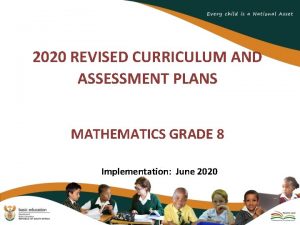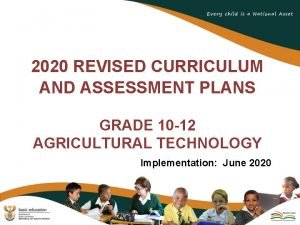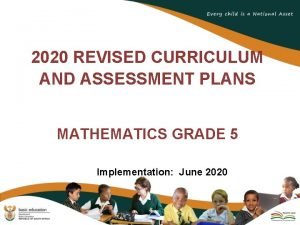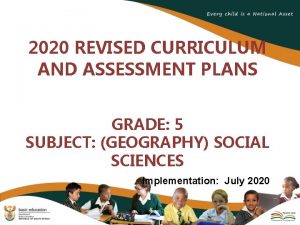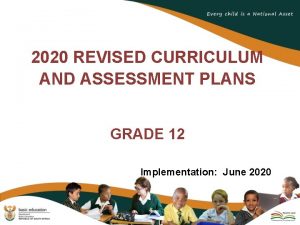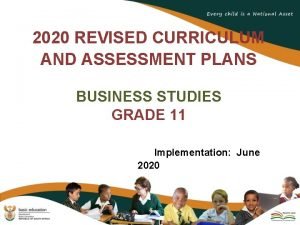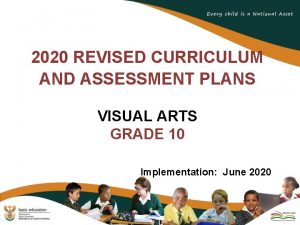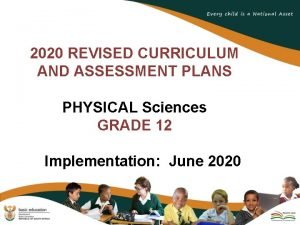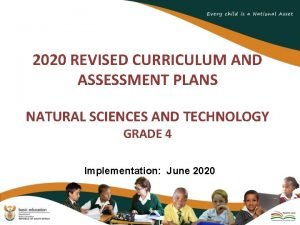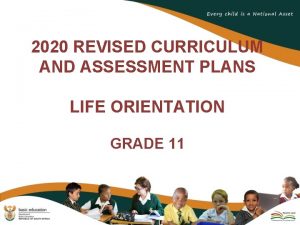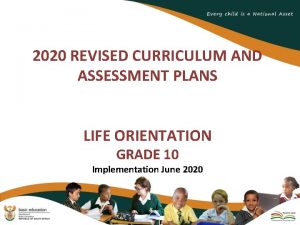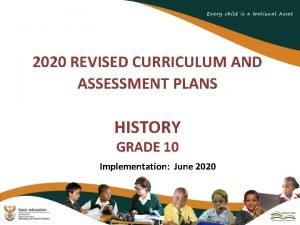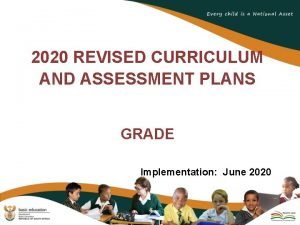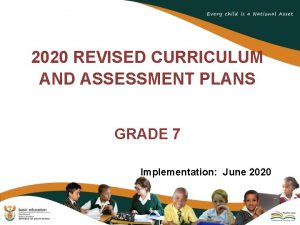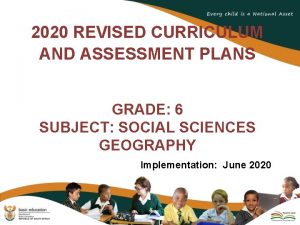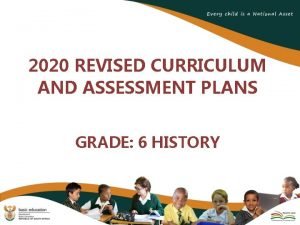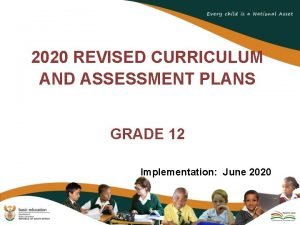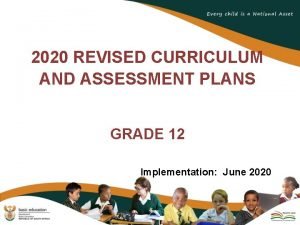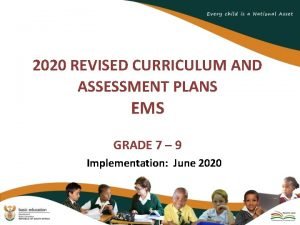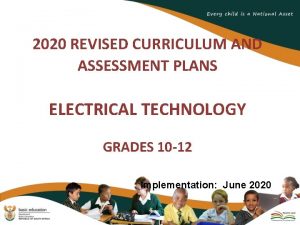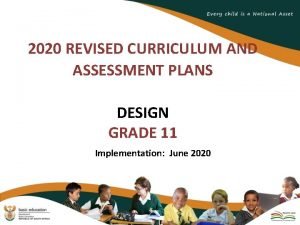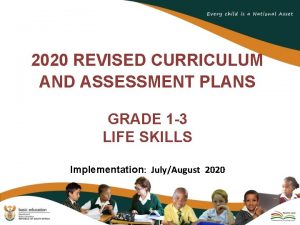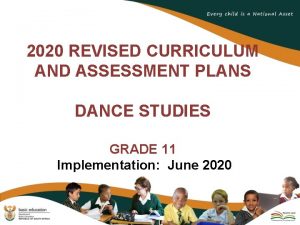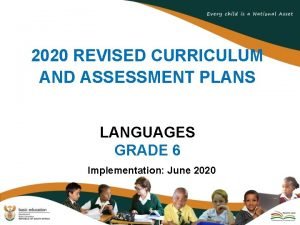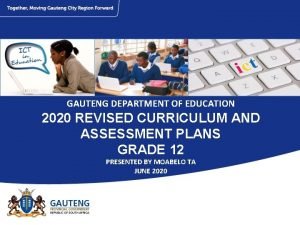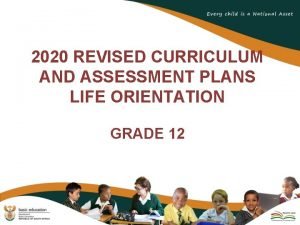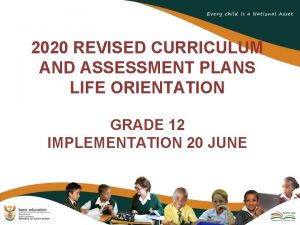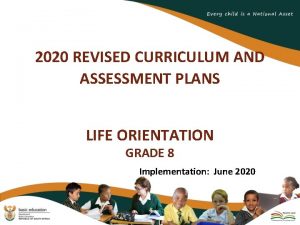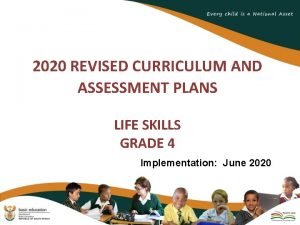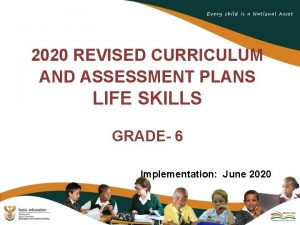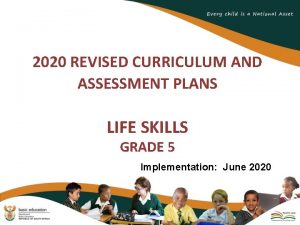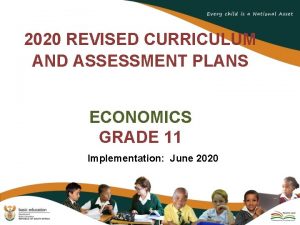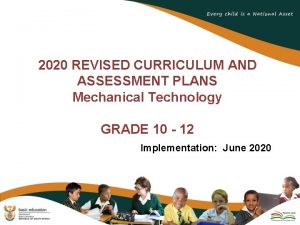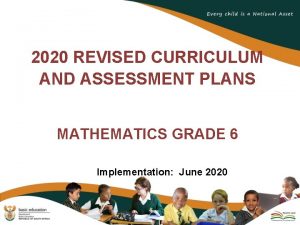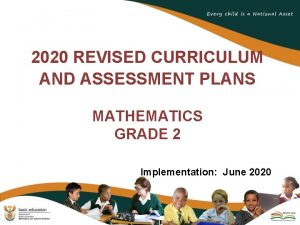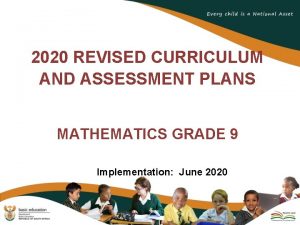2020 REVISED CURRICULUM AND ASSESSMENT PLANS LIFE ORIENTATION



























- Slides: 27

2020 REVISED CURRICULUM AND ASSESSMENT PLANS LIFE ORIENTATION GRADE 12 IMPLEMENTATION 20 JUNE

Presentation Outline 1. Purpose 2. Amendments to the Content Overview for the Phase; 3. Amendments to the Annual Teaching Plan; 4. Amendments School Based Assessment (SBA) 5. Conclusion

1. Purpose • To mediate the amendments of the trimmed and re-organised 2020 Annual Teaching Plan including School Based Assessment for Life Orientation, Grade 12 for implementation in June 2020 as stipulated in Circular S--. • To ensure that meaningful teaching proceeds during the remaining teaching time as per the revised school calendar. • To assist teachers with guided pacing and sequencing of curriculum content and assessment.

1. Purpose (continued) • To enable teachers to cover the essential core content /skills in each grade within the available time. • To assist teachers with planning for the different forms of assessment. • To ensure learners are adequately prepared for the subsequent year/s in terms of content, skills, knowledge, attitudes and values

2. Amendments to the Content Overview for the Phase

SUMMARY: LO AMENDMENTS TO THE CONTENT OVERVIEW FOR THE PHASE Topic 1. Study skills GRADE 10 Study skills: listening, reading, comprehension, concentration, memory, organisation and time management • Study methods: note-taking, mindmapping, selecting important concepts and content, assignment and essay construction and making comparisons • Critical, creative and problem-solving skills • Process of assessment: internal and external • Annual study plan Removed GRADE 11 GRADE 12 Applying own study skills, styles and study • Preparing for success: strategies to follow in order Study skills: examine how learning takes to succeed in the Grade place and reflect on effectiveness; 12 examination -Revision of own study Study styles as preferred way of skills approaching tasks; -Revision of examination Study strategy as a way to approach a writing skills specific task in the light of perceived demands Examination writing skills and process of assessment Time management skills and annual study plan “Goal-setting skills: personal development goals regarding study, health and fitness”. Removed , the content is repeated).

2. SUMMARY: LO AMENDMENTS TO THE CONTENT OVERVIEW FOR THE PHASE Topic Social and Environment al responsibility GRADE 10 • Contemporary social issues that impact negatively on local and global communities (removed) Concepts: social and environmental justice Social issues: crime, poverty, food security, food production, violence, HIV and AIDS, safety, security, unequal access to basic resources, (Removed) lack of basic services (water and health services) harmful effects of these issues on personal and - Social responsibilities including the knowledge and skills to make informed decisions and take appropriate action Youth service development: youth and civic organizations, community services or projects and volunteerism (removed). Purpose and contribution, areas of strength and possible improvements. Own contribution to these services, projects and organizations: a group project to address a contemporary social issue that impacts negatively GRADE 11 GRADE 12 Environmental issues that cause ill-health: • Community responsibility to Dealing with environmental factors provide environments and that cause ill-health on personal level: services that promote safe and attitudes, safety and first aid skills and. healthy living: Coping with disasters. -Responsibilities of various Climate change: causes, impact on levels of government: laws, development, mitigation, and adaptation. • The use of harmful substances in food regulations, rules and production; Inhumane farming methods; community services Impact of degradation on society and the -Educational and intervention environment: environmental hazards programmes; impact studies such as soil erosion, pollution, radiation, floods, fires, damage caused • Formulating a personal by wind and loss of open space or lack mission statement for life based of infrastructure. Impact of depletion of on: -Personal views, values, resources such as fishing stocks, belief system, religion, firewood and land ideologies, lifestyle (physical (Removed) and emotional well-being), • Participation in a community service that environmental responsibility, addresses a contemporary environmental issue indicating how this goals for studies and career choices harm certain sectors of society more • impact of vision on: than others. (Removed) -Actions/behaviour in life -immediate community and society at large

2. SUMMARY: LO AMENDMENTS TO THE CONTENT OVERVIEW FOR THE PHASE (con) Topic Social and Environment al responsibility GRADE 10 • Social skills and responsibilities to participate in civic life Social, constructive and critical thinking skills necessary to participate in civic life: - Social responsibilities including the knowledge and skills to make informed decisions and take appropriate action Youth service development: youth and civic organizations, community services or projects and volunteerism (Removed) Purpose and contribution, areas of strength and possible improvements. Own contribution to these services, projects and organizations: a group project to address a contemporary social issue that impacts negatively on local and/or global communities (Removed) GRADE 11 GRADE 12

3. SUMMARY: LO AMENDMENTS TO THE CONTENT OVERVIEW FOR THE PHASE Topic Developme nt of the self in society GRADE 10 • Life roles: child, student, adult, role in family, partner, mother, father, grandparent, breadwinner, employee, employer, leader and follower - Evolving nature of and responsibilities inherent in each role; how roles change and affect relationships - Handling each role effectively: influence of society and culture • Changes associated with development towards adulthood: adolescence to adulthood - Physical changes: hormonal, increased growth rates, bodily proportions, secondary sex/gender characteristics, primary changes in the body (menstruation, ovulation and seed formation) and skin problems (Removed) - Emotional changes: maturing personality, depth and control of emotions, feelings of insecurity, changing needs, interests, feelings, beliefs, values and sexual interest - Social changes: relationship with family, interaction with social groups, need for acceptance by and dependence on peer group, moving GRADE 11 GRADE 12 • Healthy and balanced lifestyle • human factors that cause ill-health, choices: accidents, crises and disasters: -Characteristics of a healthy psychological, social, religious, cultural and balanced lifestyle: physical, practices and different knowledge psychological, social, emotional perspectives and spiritual facets -Lifestyle diseases as a result of -Factors that impact negatively poverty and gender imbalances: on lifestyle choices: cancer, hypertension, diseases of the Accidents; types of accidents; heart and circulatory system, lack of knowledge and skills; tuberculosis, sexually transmitted unsafe attitudes and behaviors; infections including hi. V and Ai. DS unsafe environments and -Contributing factors: eating habits, lack emotional factors” (Reof exercise, smoking, substance abuse clustered and infused into and unsafe sexual behaviour Youth Risks Behavior) -intervention strategies: prevention and Risky behaviour and situations: control, early detection, treatment, care personal safety, road use, and support substance use and abuse, • Commitment to participate in physical sexual behaviour, risk of activities for long-term engagement: pregnancy, teenage suicides, develop an action plan hygiene and dietary behaviour, -Long-term effects of participation: sexually-transmitted infections physical, mental, social and emotional (STis), hi. V & Ai. DS and peer -Value-added benefits and diseases of pressure lifestyle

SUMMARY: LO AMENDMENTS TO THE CONTENT OVERVIEW FOR THE PHASE (Con) Topic 3. Development of the self in society GRADE 10 Values and strategies to make responsible decisions regarding sexuality and lifestyle choices to optimise personal potential - Behaviour that could lead to sexual intercourse and teenage pregnancy, sexual abuse and rape - Values such as respect for self and others, abstinence, self-control, right to privacy, right to protect oneself, right to - say ‘No’ and taking responsibility for own actions - Skills such as selfawareness, critical thinking, decision-making, problem-solving, assertiveness, negotiations, communication, refusal, goal-setting and information gathering relating to sexuality and lifestyle choices - Where to find help GRADE 11 Socio-economic environment: literacy, income, poverty, culture and social environment -Factors that impact positively on lifestyle choices: • Positive role models; parents and peers; personal values; belief system; religion; media, social and cultural influences; economic conditions -impact of unsafe practices on self and others: physical, emotional, spiritual, social, economic, political and environmental -individual responsibility for making informed decisions and choices: coping with and overcoming barriers regarding behaviour and seeking support, advice and assistance • Role of nutrition in health and physical activities GRADE 12

3. SUMMARY: LO AMENDMENTS TO THE CONTENT OVERVIEW FOR THE PHASE (Con) Topic Development of the self in society GRADE 10 • Emotional changes: maturing personality, depth and control of emotions, feelings of insecurity, changing needs, interests, feelings, beliefs, values and sexual interest - Social changes: relationship with family, interaction with social groups, need for acceptance by and dependence on peer group, moving into the workforce and increased responsibilities • Coping with change: - importance of communication and making friends - Behaviour that could lead to sexual intercourse and teenage pregnancy, sexual abuse and rape - Values such as respect for self and others, abstinence, self-control, right to privacy, right to protect oneself, right to say ‘No’ and taking responsibility for own actions - - Skills such as self-awareness, critical thinking, decision-making, problem-solving, assertiveness, negotiations, communication, refusal, goal-setting and information gathering relating to sexuality and lifestyle choices (Removed) - - Where to find help regarding sexuality and lifestyle choice GRADE 11 • Gender roles and their effects on health and wellbeing: self, family and society -Unequal power relations, power inequality, power balance and power struggle between genders: abuse of power towards an individual (physical abuse), in family (incest), cultural (different mourning periods for males and females), social (domestic violence and sexual violence/rape) and work settings (sexual harassment) -Negative effects on health and well-being -Addressing unequal power relations and power inequality between genders GRADE 12

SUMMARY: LO AMENDMENTS TO THE CONTENT OVERVIEW FOR THE PHASE Topic 4. Careers and career choices GRADE 10 Diversity in jobs: - Economic sectors: primary (raw materials), secondary (finished products or goods) and tertiary (infrastructure and providing services) - Work settings: workplace environment and conditions; indoors and outdoors (laboratory, mine) - Activities involved in each job: designing, assembling and growing - Skills and competencies: information gathering or analysis and instruction - • Opportunities within different career fields including work in recreation, fitness and sport industries: - - Research skills, salary package, promotion and further study prospects - Profitable use of time, how to use talents in working and career opportunities, enjoyment and transfer of skills to other related industries. GRADE 11 GRADE 12 Competencies, abilities and ethics • Core elements of a job contract: that will assist in securing a job worker rights and obligations; and developing a career: conditions of service Studying advertisements, writing an application letter, -Labour laws: Labour Relations Act, Employment Equity Act and Basic and completing application Conditions of Employment Act forms Writing and building a -Principles of equity and redress curriculum vitae (CV): all -Recruitment process: general forms of experience gained, trends and practices acquisition of testimonials -Trade unions and organised labour and evidence of job -Work ethics and societal shadowing and expectations informal job Removed: • The value of work: how work gives These aspects are also meaning to life. treated in English(-FAL) Additional and higher – education • Refinement of portfolio of plans for studies required for different life after school: record of plans and careers (Removed: Grade 12, LO, CAPS, treats similar content. progress towards achievement of those plans -Admission requirements for degree/diploma or higher certificate for the intended field of study -

SUMMARY: LO AMENDMENTS TO THE CONTENT OVERVIEW FOR THE PHASE (Con) Topic 4. GRADE 10 GRADE 11 GRADE 12 Careers and Awareness of trends and Managing meetings, managing a project career choices demands in the job market: and office administration skills emerging demands or changing -interview skills: personal appearance and patterns of careers and scarce preparation for typical questions skills and the job market -Ethics and ethical behaviour: transparency - Reading the market for trends and accountability regarding jobs and identifying • Personal expectations in relation to Details of identified institutions niches job/career of interest: that offer finance for the - Growth and decline of various -Expectancy and reality intended course(s): option 1 and occupations and fields of work -Chances of success and satisfaction 2 and competencies linked to -Suitability audit -Identified possible employment these jobs • Knowledge about self in relation to the opportunities - SAQA, the NQF framework demands of the world of work and socio-Letters of application and recognition of prior economic conditions: skilled, semi-skilled, responses for learning unskilled and physical labour employment/study/bursary - The need for lifelong learning: -Additional and higher education studies -A short CV, for application for - ability to change, re-train, required for different careers part-time or full-time flexibility and ongoing -Expectancy, reality and perseverance employment or for a bursary development of the self - Different kinds of learning: formal, informal and nonformal

SUMMARY: LO AMENDMENTS TO THE CONTENT OVERVIEW FOR THE PHASE Topic 5 GRADE 10 Democracy and • Living in a multi-religious society: human rights understanding ethical traditions and/or religious laws of major religions in South Africa - Major Religions: Judaism, Christianity, Islam, Hinduism Buddhism, Baha’I Faith and African Religion - indigenous belief systems in South Africa: origins and practices Biases and unfair practices in sport • Coverage of sport: ways to redress biases - Gender, race, stereotyping and sporting codes - -Unfair practices: drug-taking, match-fixing, subjective umpiring and maladministration in sport - Process of analysis and critical evaluation GRADE 11 GRADE 12 • Contributions of South • Responsible citizenship: Evaluating own Africa’s diverse position when dealing with discrimination and religions and belief human rights violations, taking into account the systems to a Bill of Rights: participation in discussions, harmonious society and projects, campaigns and events which address own belief system: discrimination and human rights violations -Clarify own values and -Evaluation regarding outcomes of campaigns beliefs and events. -identify and critically • The role of the media in a democratic society: analyse various moral electronic and print media and spiritual issues and -Freedom of expression and limitations dilemmas: right-to-life, -Extent to which media reporting reflects a euthanasia, cultural democratic society: topics covered, positions practices and traditions, taken by editors, space allocated economic issues and to topics and geographical distribution environmental issues (accessibility of information to different groups -Respect differing in society) opinions -Critical analysis of media and campaigns -Coverage of sport, sports personalities and recreation activities • ideologies, beliefs and worldviews on recreation and physical activity across cultures and genders

3. Amendments to the Annual Teaching Plan

Summary: Content/Topics Amended Content/Topics Term 4 Amendment • NO AMENDMENTS WERE MADE EXCEPT THE REMOVAL OF PET/ PE IN THE SECOND, THIRD AND FOURTH TERMS. • CAT IS SHIFTED TO THE FOURTH TERM • THE CONTENT STAYS THE SAME


Summary: Amendment to the weighting of content topics

4. Amendments School Based Assessment (SBA)

Summary: Revised Programme of Assessment Term 2 Study skills • Study skills: listening, reading, comprehension, concentration, memory, organisation and time management • • Study methods: note-taking, mind-mapping, selecting important concepts and content, assignment and essay • construction and making comparisons • Critical, creative and problem-solving skills Term 3 Development of the self in society. • Life roles: nature and responsibilities • Life roles: child, student, adult, role in family, partner, mother, father, grandparent, breadwinner, employee, employer, leader and follower - Evolving nature of and responsibilities inherent in each role; how roles change and affect relationships - Handling each role effectively: influence of society and culture Social and environmental responsibility • • Contemporary social issues that impact negatively on local communities: • - Concepts: social and environmental justice • - Social issues: crime, poverty, food security, lack of basic services (water and health services) • harmful effects of these issues on personal and community health • Social skills and responsibilities to participate in civic life • Social, constructive and critical thinking skills necessary to participate in civic life: Changes towards adulthood • Changes associated with development towards adulthood: adolescence to adulthood. Term 4 Careers and career choices Awareness of trends and demands in the job market: emerging demands or changing patterns of careers and scarce skills and the job market - Reading the market for trends regarding jobs and identifying niches - Growth and decline of various occupations and fields of work and competencies linked to these jobs - SAQA, the NQF framework and recognition of prior learning. The need for lifelong learning: - ability to change, re-train, flexibility and ongoing development of the self - - Different kinds of learning: formal, informal and non-formal Democracy and human rights - Emotional changes: maturing personality, depth and control of emotions, feelings of insecurity, changing needs, interests, feelings, beliefs, values and sexual interest - Social changes: relationship with family, interaction with social groups, need for acceptance by and dependence on peer group, moving into the workforce and increased responsibilities • Living in a multi-religious society: understanding ethical traditions and/or religious laws of major religions in South Africa Coping with change: importance of communication and making friends - Unfair practices: drug-taking, match-fixing, subjective umpiring and maladministration in sport - Process of analysis and critical evaluation - Major Religions: Judaism, Christianity, Islam, Hinduism Buddhism, Baha’I Faith and African Religion - indigenous belief systems in South Africa: origins and practices. • Biases and unfair practices in sport • Coverage of sport: ways to redress biases - Gender, race, stereotyping and sporting codes

Summary: Revised Programme of Assessment Term 2 Term 3 • Social responsibilities including the knowledge and skills to make informed decisions and take appropriate action • Values and strategies to make responsible decisions regarding sexuality and lifestyle choices to optimise personal potential • - Youth service development: youth and civic organizations, community services or projects and volunteerism Behaviour that could lead to sexual intercourse and teenage pregnancy, sexual abuse and rape - Values such as respect for self and others, abstinence, self-control, right to privacy, right to protect oneself, right to say ‘No’ and taking responsibility for own actions - Where to find help regarding sexuality and life style choices - Recreation and emotional health - Relationship between recreational activities and emotional health CAREERS AND CAREER CHOICES Diversity in jobs: - Economic sectors: primary (raw materials), secondary (finished products or goods) and tertiary (infrastructure and providing services) - Work settings: workplace environment and conditions; indoors and outdoors (laboratory, mine) - Activities involved in each job: designing, assembling and growing S- Skills and competencies: information gathering or analysis and instruction - Various facets of self and integration into the world of work • - Purpose and contribution, areas of strength and possible improvements Term 4

Summary: Revised Programme of Assessment Term 2 • Term 3 • Opportunities within different career fields including work in recreation, fitness and sport industries: - Research skills, salary package, promotion and further study prospects - Profitable use of time, how to use talents in working and career opportunities, enjoyment and transfer of skills to other related industries Term 4

4. Amendments School Based Assessment (SBA)

PROGRAMME OF ASSESSMENT MARKS Term Assessment task 1 2 3 4 Recording Written task 80 PET 20 Short task Project/ Task Final examination 60 80 80 YEAR % Reporting 100 60/60 x 100 100 80/80 X 100 25% 25%

Summary: Revision Final Examination Structure Grades 10 and 11 section a: 20 marks section B: 30 marks • All questions are compulsory. • A source or case study may be used to contextualise some of the questions • Short open-ended, scenario-based, source-based and case study questions • The questions have to be a combination of two or more types of questions ranging from what, why, list, describe, explain, multiple choice and true or false with a justification • Questions should be knowledgebased, from information learners have acquired from the Life Orientation content • Test understanding and factual knowledge • Responses should be short and direct and range from one word to a phrase or a full sentence/s (in point form) • Learners should display, present and apply knowledge and skills gained and display an understanding of real-life issues affecting the youth and society at solutions: demonstrate goal-setting and decision-making skills section C: 30 marks • Three 15 -mark or four 10 -mark questions will be set, of which learners will be expected to answer two or three respectively. • Questions will predominantly focus on the application of knowledge and skills • Learners will solve problems, make decisions and give advice, raging from a few direct responses to extended writing of descriptive paragraphs or short essays that state, evaluate or examine an issue • Each question will focus on the specific topic or the integration of content • Learners should provide direct • A short text/ diagram/data/graphs/ responses, full sentences in point cartoons can be provided as a form and extended writing in short stimulus paragraphs Note. information provided in the texts have to be current, up-to-date, age-appropriate and learner-friendly. Each section will include questions at lower, middle and higher cognitive levels.

4. Conclusion

Contact Details Name: CES: Subjects Dr K Perumal Department of Basic Education Tel: 012 357 4257 /0843012514 Email: Perumal. K@dbe. gov. za
 2020 revised curriculum and assessment plans
2020 revised curriculum and assessment plans Revised programme of assessment 2020
Revised programme of assessment 2020 2021 revised curriculum and assessment plans
2021 revised curriculum and assessment plans 2020 revised curriculum and assessment plans grade 7
2020 revised curriculum and assessment plans grade 7 Physical features of south africa grade 5
Physical features of south africa grade 5 2020 revised curriculum and assessment plans
2020 revised curriculum and assessment plans Business studies grade 11 2020 term 2 sba task presentation
Business studies grade 11 2020 term 2 sba task presentation 2020 revised curriculum and assessment plans
2020 revised curriculum and assessment plans Revised curriculum 2020
Revised curriculum 2020 Revised curriculum 2020
Revised curriculum 2020 2020 revised curriculum and assessment plans
2020 revised curriculum and assessment plans 2021 revised curriculum and assessment plans
2021 revised curriculum and assessment plans 2020 revised curriculum and assessment plans
2020 revised curriculum and assessment plans 2020 revised curriculum and assessment plans
2020 revised curriculum and assessment plans 2020 revised curriculum and assessment plans grade 7
2020 revised curriculum and assessment plans grade 7 2020 revised curriculum and assessment plans grade 7
2020 revised curriculum and assessment plans grade 7 2020 revised curriculum and assessment plans grade 7
2020 revised curriculum and assessment plans grade 7 2020 revised curriculum and assessment plans grade 6
2020 revised curriculum and assessment plans grade 6 2020 revised curriculum and assessment plans grade 6
2020 revised curriculum and assessment plans grade 6 Revised curriculum 2020
Revised curriculum 2020 Revised curriculum and assessment plans 2021
Revised curriculum and assessment plans 2021 Ems grade 8 term 1 assignment
Ems grade 8 term 1 assignment Electrical technology grade 12
Electrical technology grade 12 2021 revised curriculum and assessment plans
2021 revised curriculum and assessment plans Conclusion of life skills
Conclusion of life skills 2021 revised curriculum and assessment plans
2021 revised curriculum and assessment plans Revised annual teaching plans 2020
Revised annual teaching plans 2020 Gde vision and mission 2021
Gde vision and mission 2021
